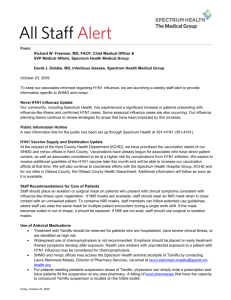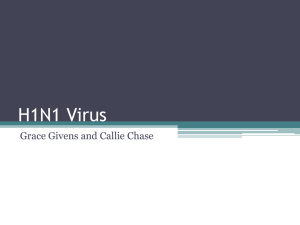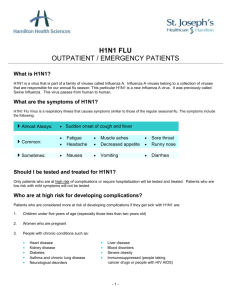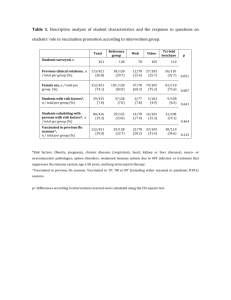H1N1 Questions and Answers for Immunocompromised Children
advertisement
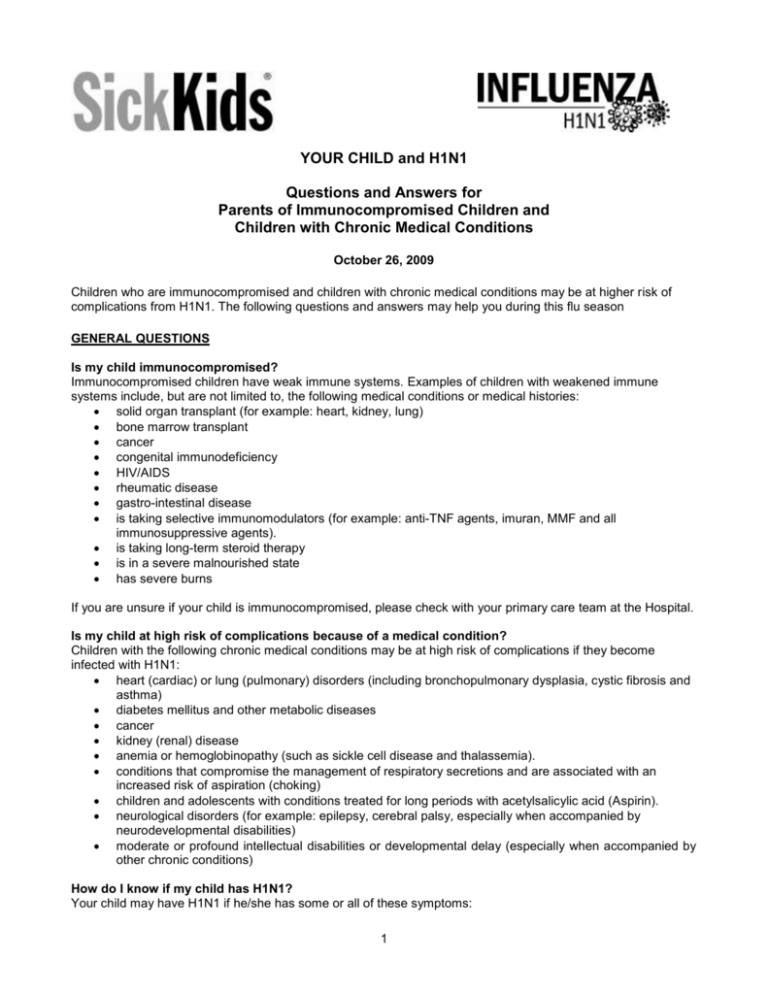
YOUR CHILD and H1N1 Questions and Answers for Parents of Immunocompromised Children and Children with Chronic Medical Conditions October 26, 2009 Children who are immunocompromised and children with chronic medical conditions may be at higher risk of complications from H1N1. The following questions and answers may help you during this flu season GENERAL QUESTIONS Is my child immunocompromised? Immunocompromised children have weak immune systems. Examples of children with weakened immune systems include, but are not limited to, the following medical conditions or medical histories: solid organ transplant (for example: heart, kidney, lung) bone marrow transplant cancer congenital immunodeficiency HIV/AIDS rheumatic disease gastro-intestinal disease is taking selective immunomodulators (for example: anti-TNF agents, imuran, MMF and all immunosuppressive agents). is taking long-term steroid therapy is in a severe malnourished state has severe burns If you are unsure if your child is immunocompromised, please check with your primary care team at the Hospital. Is my child at high risk of complications because of a medical condition? Children with the following chronic medical conditions may be at high risk of complications if they become infected with H1N1: heart (cardiac) or lung (pulmonary) disorders (including bronchopulmonary dysplasia, cystic fibrosis and asthma) diabetes mellitus and other metabolic diseases cancer kidney (renal) disease anemia or hemoglobinopathy (such as sickle cell disease and thalassemia). conditions that compromise the management of respiratory secretions and are associated with an increased risk of aspiration (choking) children and adolescents with conditions treated for long periods with acetylsalicylic acid (Aspirin). neurological disorders (for example: epilepsy, cerebral palsy, especially when accompanied by neurodevelopmental disabilities) moderate or profound intellectual disabilities or developmental delay (especially when accompanied by other chronic conditions) How do I know if my child has H1N1? Your child may have H1N1 if he/she has some or all of these symptoms: 1 fever cough sore throat runny or stuffy nose body aches headache chills fatigue sometimes diarrhea and vomiting While fever might be the most prominent symptom in immunocompromised children, it’s important to note that not all children with H1N1 will have a fever. Also, infants and young children may have non-specific symptoms. Some children with chronic lung conditions might have symptoms that could mimick the flu, but are not the flu. Should I come to the Hospital if I think my child has H1N1? If your child has symptoms of the flu, we recommend that you contact your primary care team at SickKids before coming to the Hospital. They will help you determine if your child needs to be seen or if you can start to treat your child at home. You should come to the Hospital right away if your child has the following symptoms: Fast breathing or trouble breathing Bluish skin color Not drinking enough fluids Not waking up or not interacting Being so irritable that the child does not want to be held Flu-like symptoms improve but then return with fever and worse cough Fever with a rash If my child is diagnosed with H1N1, how long will he/she be sick? Children with weakened immune systems may be sick for a longer period of time than other children. How long will vary from child to child. VACCINATION Should my child receive the H1N1 vaccine? Yes. The vaccine is safe for immunocompromised children and those with chronic medical conditions. The vaccine is not given to infants less than six months of age however. Your doctor will advise you of the best treatment plan for your child if he/she is younger than six months. Should my child receive the seasonal flu vaccine? Yes. We fully endorse this vaccine. The vaccine is safe for immunocompromised children as well as children with chronic medical conditions. The vaccine is not given to infants less than six months of age however. Here is a chart showing who should receive which vaccines: < 6 months of age 6 months to 18 years H1N1 vaccine No (speak to your doctor about a treatment plan for your child) Yes Seasonal flu vaccine No After the H1N1 vaccine Can transplant patients receive the H1N1 vaccine? Yes. They and their families should receive the vaccine. Vaccination is not recommended within the first month after transplantation however. 2 My child has an egg allergy. Should he/she receive the H1N1 vaccine? Your doctor should consult the immunology department at SickKids if your child fits any of the following criteria: - has had hives, swelling of the lips or tongue or has experienced acute respiratory distress after eating eggs, - has documented (IgE)-mediated hypersensitivity to eggs - has had asthma related to egg exposure or other allergic responses to egg protein There is a special protocol for giving the H1N1 vaccine to children with severe egg allergy. TREATMENT Should my child receive Tamiflu treatment if he/she has symptoms of H1N1? SickKids recommends giving Tamiflu to children with weakened immune systems with H1N1 if they get medical attention within 48 hours of first experiencing symptoms. Some patients who have had symptoms for longer than 48 hours may still require treatment with Tamiflu. Is Tamiflu safe for children under one year of age? Health Canada has reviewed the available safety data about the use of Tamiflu in children under one year of age. Health Canada has concluded that the known and potential benefits of Tamiflu outweigh the known and potential risks. Final treatment decisions should be made by your doctor, after the weighing the risks and benefits to your child. SCHOOL AND THE COMMUNITY My child played with/is in a classroom with/lives with someone who now has H1N1? What should I do? Your child may be at risk of H1N1 infection if he/she has had close, face-to-face with a person who has confirmed, probable or suspected H1N1. To avoid close contact, your child should not share eating or drinking utensils, should not share food or beverages, should avoid kissing or shaking hands with an infected person and should stay at least three feet away from anyone who is openly coughing or sneezing. Other activities such as walking or sitting across a classroom from an infected person should not put your child at risk. In some cases, if your child has been in close, face-to-face contact with another person who has confirmed, probable or suspected H1N1, they may be prescribed Tamiflu. If your child begins to exhibit syptoms of H1N1, contact your primary care team at SickKids. They will advise you if you should come to the Hospital. You do not need to have your child treated if they do not develop symptoms. There are cases of H1N1 at my child’s school. What should I do? If there is an outbreak in your child’s school, Public Health will provide guidance. You do not need to have your child treated if they do not develop symptoms. Should my child avoid public places such as shopping malls and public transit? It's important that people continue their daily lives during the pandemic. However, SickKids advises that children with very weak immune systems limit their exposure to large crowded situations. In crowded situations that cannot be avoided, extra precautions should be taken such as frequent handwashing, to avoid picking up the virus. It is wise to carry hand sanitizer for the same purpose. Are they any extra precautions that I she/he be taking? Encourage your child to wash or sanitize their hands frequently. If she/he is in school, for example, provide her/him with a bottle of alcohol-based hand sanitizer. Avoid having your child in close contact with anyone who has symptoms of H1N1. Be vigilant for signs of infection in your child. 3
